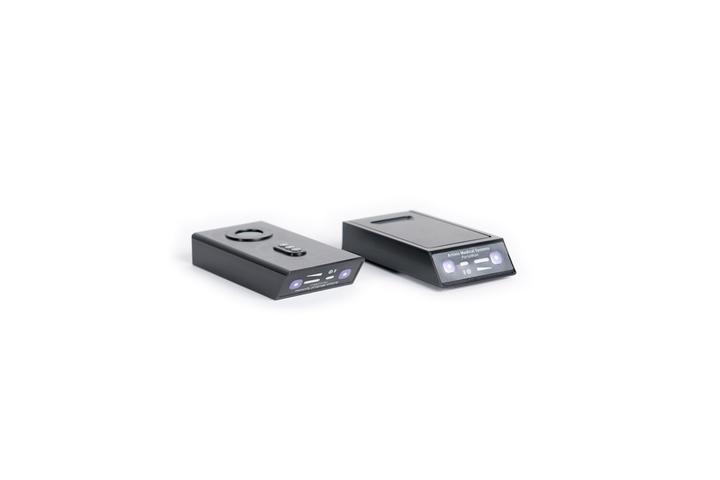PortaMon
The gold-standard research device for the measurement of muscle oxygenation

Publications using the PortaMon
Muscle force recovery in relation to muscle oxygenation
The aim of this study was to investigate the relative contribution of human muscle reoxygenation on force recovery following a maximal voluntary contraction (MVC). Ten athletes (22˙9 ± 4˙0 years) executed a plantar-flexion sequence including two …
Evaluation of muscle oxygenation by near-infrared spectroscopy in patients with Becker muscular dystrophy
Several authors have reported alterations in vasodilation during effort in patients with dystrophinopathies, in which a lack of neuronal NO synthase is thought to lead to functional muscle ischemia. In order to determine changes in muscle oxygenation …
Asymmetry of quadriceps muscle oxygenation during elite short-track speed skating
PURPOSE: It has been suggested that, because of the low sitting position in short-track speed skating, muscle blood flow is restricted, leading to decreases in tissue oxygenation. Therefore, wearable wireless-enabled near-infrared spectroscopy (NIRS) …
Monitoring of lower urinary tract function in patients with spinal cord injury using near infrared spectroscopy
Background: One of the most important conditions where there is loss of normal bladder function is spinal cord injury (SCI). Currently, evaluation of bladder function is limited to periodic invasive urodynamic testing (UDS). The purpose of this study …
Review: The evolution of wireless near infrared spectroscopy applications in urology and rationale for clinical use
Near infrared (NIR) spectroscopy is an established non-invasive optical technique for measuring changes in haemoglobin concentration occurring in the microcirculation in real time. NIR spectroscopy parameters refect change in tissue haemodynamics and …
Ambulant monitoring of bladder oxygenation and hemodynamics using wireless near-infrared spectroscopy
INTRODUCTION: Near-infrared spectroscopy (NIRS) non-invasively detects changes in the concentration of the chromophores oxygenated (DeltaO(2)Hb) and deoxygenated hemoglobin (DeltaHHb) as the bladder detrusor muscle contracts during voiding. Such data …
Biomedical applications of wireless continuous wave near infrared spectroscopy
Progress in research applications of near infrared spectroscopy (NIRS) and growing clinical interest have led to significant improvements in hardware and software. Amongst continuous wave systems the use of light emitting diodes, incorporation of …
Fetal oxygenation measurement using wireless near infrared spectroscopy
Background: Fetal well-being is determined in large part by how well the placenta is able to supply oxygen and nutrients, but current technology is unable to directly measure how well a placenta functions. Near-infrared spectroscopy (NIRS) utilizes …
Muscle contractile properties in patients with repetitive strain injury
Objectives Repetitive strain injury [RSI] is a multi-factorial overuse syndrome that has been associated with local vascular and muscular impairments. Recently, we found vascular changes also in the non-affected site, which is suggestive for systemic …
The use of near-infrared spectroscopy in understanding skeletal muscle physiology: Recent developments
This article provides a snapshot of muscle near-infrared spectroscopy (NIRS) at the end of 2010 summarizing the recent literature, offering the present status and perspectives of the NIRS instrumentation and methods, describing the main NIRS studies …
Assessing running economy during field running with changes of direction: Application to 20 m shuttle runs
Purpose: To examine physiological responses to submaximal field running with changes of direction (COD), and to compare two approaches to assess running economy (RE) with COD, ie, during square-wave (SW) and incremental (INC) exercises. Methods: Ten …
Reproducibility and sensitivity of muscle reoxygenation and oxygen uptake recovery kinetics following running exercise in the field
The purpose of this study was to assess the reliability of postexercise near-infrared spectroscopy (NIRS)-derived measurements and their sensitivity to different exercise intensities in the field. Seventeen athletes (24˙1±5˙6year) repeated, on three …
Near-Infrared Spectroscopy of the Bladder: New Parameters for Evaluating Voiding Dysfunction
We describe innovative methodology for monitoring alterations in bladder oxygenation and haemodynamics in humans using near-infrared spectroscopy (NIRS). Concentrations of the chromophores oxygenated (O 2 Hb) and deoxygenated (HHb) haemoglobin and …
Influence of training and maturity status on the cardiopulmonary responses to ramp incremental cycle and upper body exercise in girls
It has been suggested that the potential for training to alter the physiological responses to exercise in children is related to a "maturational threshold". To address this, we investigated the interaction of swimtraining status and maturity on …
Dietary nitrate supplementation enhances exercise performance in peripheral arterial disease
Peripheral arterial disease (PAD) results in a failure to adequately supply blood and oxygen (O2) to working tissues and presents as claudication pain during walking. Nitric oxide (NO) bioavailability is essential for vascular health and function. …
Effect of endurance training on performance and muscle reoxygenation rate during repeated-sprint running
The aim of the present study was to examine the effect of an 8-week endurance training program on repeated-sprint (RS) performance and post-sprints muscle reoxygenation rate in 18 moderately trained males (34 ± 5 years). Maximal aerobic speed (MAS), …
Performance and physiological responses to repeated-sprint and jump sequences
In this study, the performance and selected physiological responses to team-sport specific repeated-sprint and jump sequence were investigated. On four occasions, 13 team-sport players (22 ± 3 year) performed alternatively six repeated maximal …
Near-infrared spectroscopy of the bladder: a new technique for studying lower urinary tract function in health and disease
Background: Continuous wave near-infrared spectroscopy (NIRS) can monitor chromophore change in the bladder detrusor muscle during voiding; oxygenation and hemodynamic data derived differ in health and disease. Application of wireless NIRS for …
Muscle tissue oxygenation and VEGF in VO2-matched vibration and squatting exercise
Summary: Exposure to vibration has traditionally been associated with compromised perfusion. This study investigated whether blood supply during whole body vibration (WBV), as an exercise modality, is in proportion to the metabolic demand by the …
Physiological responses to shuttle repeated-sprint running
This study investigated the influence of 180° changes of direction during a repeated-sprint running test on performance, cardiorespiratory variables, muscle deoxygenation and post-exercise blood lactate ([La] levels. Thirteen team-sport athletes …